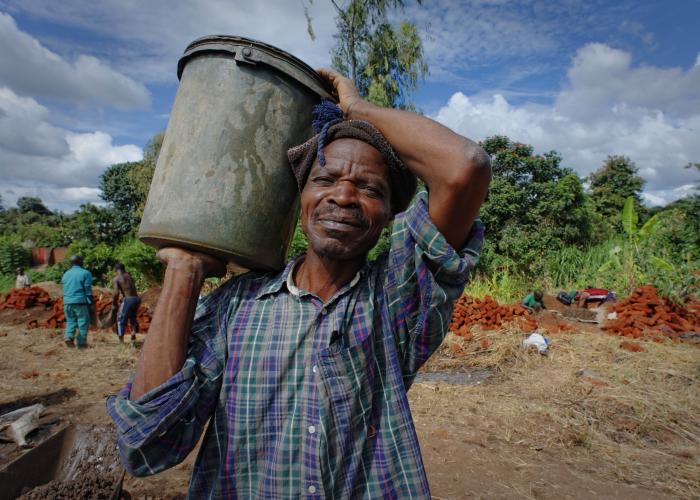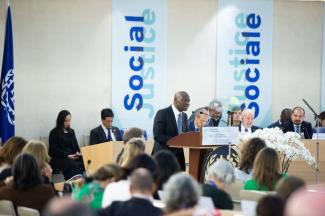Global Coalition for Social Justice recognized as a Key Platform to advance the Doha Declaration
At the Global Coalition for Social Justice Forum, held on 5 November in Doha during the World Summit for Social Development, world leaders and partners urged stronger collective action to turn the Doha Declaration into reality. The Forum provided a platform for fifteen partners to announce concrete initiatives developed under the Coalition, each aligned with and supporting a specific commitment of the Political Declaration adopted at the Summit.
At the opening of the Forum, Qatar, the host country of the Summit announced its adhesion to the Coalition, becoming its 400th partner. Marking this milestone, Ali bin Saeed bin Samikh Al Marri, Minister of Labour, stated that this decision reflects “Qatar’s genuine commitment to strengthening international cooperation for equity in the world of work.” Through its participation, Qatar aims to help shape a new global agenda for social justice - one that integrates economic, social, and environmental policies, supports a just transition to a green economy, and extends social protection to the most vulnerable. This demonstrates Qatar’s determination to advance global cooperation on social development and translate the Political Declaration into concrete action.
As Co-Chair of the Coalition’s Coordinating Group and co-convener of the Forum, Brazil, represented by Wellington Dias, Minister of Social Development and Assistance, Family and Fight against Hunger, stated that “we cannot achieve social justice without fighting poverty and hunger.”
Brazil is prioritizing two key interventions:
- Promoting equitable food systems through its Global Alliance Against Poverty and Hunger
- Leading the International Equal Pay Coalition (EPIC) as Chair for the current year.
These initiatives advance paragraph 2 of the Doha Declaration - which calls for a holistic approach to poverty eradication - and paragraph 11, reaffirming the need for gender equality and the empowerment of all women and girls.
As a co-convener of the Forum, Switzerland, represented by Valérie Berset-Bircher, Ambassador and State Secretary, emphasized the need to align economic transformation with social justice by linking growth and equity. “We need to adopt a social justice lens to identify the policies and actions that need to be put in place to foster investment and growth” underlined Ms Berset-Bircher. Switzerland reaffirmed its commitment to two key interventions:
- Encouraging Sustainable Investment for Social Justice
- Fostering Productivity Ecosystems for Decent Work and Social Justice.
Both initiatives will help mobilizing resources contributing to the implementation of paragraphs 3 and 15 of the Doha Declaration, which call for inclusive and sustainable economic growth, full and productive employment, and decent work for all- essential foundations for poverty eradication and social inclusion.
Representing employers, Roberto Suárez, Secretary-General of the International Organisation of Employers (IOE), reaffirmed the private sector’s support for the Coalition through initiatives contributing to shared prosperity, sustainable enterprises and inclusive employment, under the key interventions on:
- Promoting Responsible Business Conduct and Skills Development
- Fostering Social Dialogue
- Encouraging an AI for social impact
“Social Justice means equal opportunities, and that matters for business to move to a more sustainable and inclusive economy” said M. Suarez as stated in paragraph 3 of the Doha Declaration, which calls for harnessing the private sector’s contribution to job creation, decent work, and higher standards of living.
Representing workers, Luc Triangle, General Secretary of the International Trade Union Confederation (ITUC), highlighted the need to foster more sustainable and inclusive societies, focusing on :
- Supporting a Human Rights Economy
- Advocating for Social Dialogue and social protection
- Accelerating Gender Equality, including through the Equal Pay International Coalition
- Promoting Living Wages
Those initiatives align with paragraph 3 of the Doha Declaration that reaffirm the global commitment to promote inclusive and sustainable economic growth, full and productive employment, and decent work for all, particularly through macroeconomic policies that foster job creation, decent work, and living wages. “The Doha Declaration is not just a text, but the start of something beautiful for billions of people who have very high expectations” underlined M. Triangle.
Türkiye, represented by Prof. Dr. Vedat Işıkhan, Minister of Labour and Social Security, reaffirmed its commitment to advance:
- A Just Transition towards Environmentally Sustainable Economies and Societies for All, as member of its Advisory Board.
This initiative advances paragraph 9 of the Doha Declaration, which calls for action to address the adverse impacts of climate change, biodiversity loss, and environmental degradation that threaten social development, particularly in developing countries. Türkiye also reaffirmed commitments to extend on social protection, empowering women and youth, and to progress on fair wages, occupational safety and health, and public services for people on temporary protection. “The future of humanity depends not only on the wealth we accumulate, but more importantly on the humanity we share.” concluded Prof. Dr. Vedat Işıkhan.
Namibia, represented by Fillemon Wise Immanuel, Minister of Justice and Labour Relations, reaffirmed its commitment to employment and the extension of social protection under
- the Global Accelerator on Jobs and Social Protection for Just Transitions as a pathfinder country
This key intervention helps advancing the objectives of paragraph 3 of the Doha Declaration on promoting decent work and inclusive economic growth by implementing its national roadmap through a participatory process involving national stakeholders. M. Fillemon Wise Immanuel praised the Doha Declaration “as a hope for a better tomorrow.”
The Netherlands, represented by Mariëlle Paul, Minister of Social Affairs and Employment, announced that the country will take:
- a leading role in the Steering Committee of the Living Wages Initiative
- and on the promotion of social dialogue.
This commitment aligns with paragraph 3 of the Doha Political Declaration, reaffirming the commitment to promote inclusive and sustainable economic growth, full and productive employment, and decent work for all-particularly through macroeconomic policies that foster job creation, decent work, and living wages. “This Social Summit is a catalyst for all of us to deliver concrete results towards achieving social justice and inclusive, sustainable development for all.” stated Minister Paul.
The Philippines, represented by Warren M. Miclat, Undersecretary of the Department of Labor and Employment, reiterated its commitment to
- implement its national roadmap as a pathfinder country of the Global Accelerator on Jobs and Social Protection for Just Transitions
- Participate in the Living Wages Initiative
- Advocate for Just Transition towards Environmentally Sustainable Economies and Societies for All
He further noted that the Global Coalition for Social Justice is “an essential mechanism to deepen collaboration among ILO constituents toward fairness, inclusivity, and sustainability in the world of work”. Those interventions align with paragraph 3 and 9 of the Doha Declaration that aims to foster decent work and standard of living for the first one and actions to address the adverse impact of climate change and biodiversity loss for the other.
Amitabh Behar, Executive Director of Oxfam International, announced Oxfam’s firm engagement to contribute to
- the Centre of Excellence on Inequalities
This is a timely initiative which fully aligns with their priorities and paragraph 3 of the Doha Declaration, which underscores the urgent need to address poverty, unemployment, and social exclusion through multi-stakeholder partnerships, notably with civil society. “After a year of mobilization in Sevilla and now in Doha, we have much greater hope things will move into the right direction. (...) Now is the time to move to actions” concluded M. Behar.
The European Commission, represented by Roxana Mînzatu, Executive Vice-President for Social Rights & Skills, announced its leadership in establishing
- a Centre of Excellence on Inequalities, building on ongoing initiatives
This key intervention will be implemented through the EU Anti-Poverty Strategy, which aims to eradicate poverty by 2050. This initiative responds to paragraphs 2 and 4 of the Doha Declaration, which call for urgent action to combat poverty, unemployment, and social exclusion, while ensuring universal access to basic services including health care, education, safe drinking water, sanitation, housing, electricity, digital connectivity, and social protection. “When we invest in people, in skills, and in partnerships, we turn our promise of social justice into real change. The EU will continue to do its part,” underlined Ms. Mînzatu.
India, represented by Mansukh Mandaviya, Minister of Labour and Employment, reaffirmed its commitment to the key intervention by
- Supporting Responsible Business Conduct for Inclusive and Sustainable Societies
It aligns with paragraph 3 of the Doha Declaration, which calls for harnessing the private sector’s contribution to job creation, decent work, and higher living standards. “India is taking decisive steps to translate the ambition of the Doha Declaration into tangible progress. These actions will empower our private sector as a pivotal force for sustainable development, creating millions of dignified livelihoods and promoting equitable growth,” stated Minister Mandaviya.
Finland, represented by Sanni Grahn-Laasonen, Minister of Social Security, confirmed the country’s engagement in
- Promoting Equal Pay International Coalition (EPIC) initiatives,
- Encouraging youth empowerment,
- Advocating for Just Transition towards Environmentally Sustainable Economies and Societies for All
- Encouraging an AI for social impact.
These align with paragraph 11 of the Doha Declaration, which reaffirms the global commitment to achieving gender equality and the empowerment of all women and girls. She underlined Finland’s commitment for “Social Justice and decent work at the heart of democratic societies.”
Colombia, represented by Antonio Sanguino Páez, Minister of Labour, announced his country's commitment to:
- be a pilot country under the key intervention Centre of Excellence on Inequalities
- implement a national roadmap as a pathfinder country for the Global Accelerator on Jobs and Social Protection for Just Transitions
Colombia is advancing policies that address poverty, inequality, and informality, in alignment with paragraphs 2 and 3 of the Doha Declaration. Minister Sanguino stressed that Colombia is helping to shape “a renewed social contract and a new pact that will emerge from the declaration’s implementation.”
Finally, Nada Al-Nashif, Deputy High Commissioner for Human Rights, presented the intervention on:
- Encouraging a Human Rights Economy
She emphasized that grounding economic and social policies in human rights and labour rights enables meaningful progress toward equality, justice, and sustainability. This aligns with paragraph 21 of the Doha Declaration, which calls for “strengthening international solidarity, upholding human rights, and a renewed commitment to multilateral action for social development.” “The Global Coalition for Social Justice creates an opportunity for all stakeholders to work together in building economies that deliver prosperity more equitably and protect and promote human rights for all.” stated Ms Al-Nashif.
Closing the forum, Mr. Li Junhua, Secretary-General of the Conference and UN Under-Secretary-General for Economic and Social Affairs and representative of the UN Secretary-General in the Coalition's coordinating group, underlined the significance of the Coalition's platform and thematic agenda to advance the implementation of the Political Declaration. He stressed: “This event clearly demonstrates that the Global coalition for social justice can serve as the engine to translate the guidance of the Doha political Declaration into tangible results. (...) Our work starts today."

